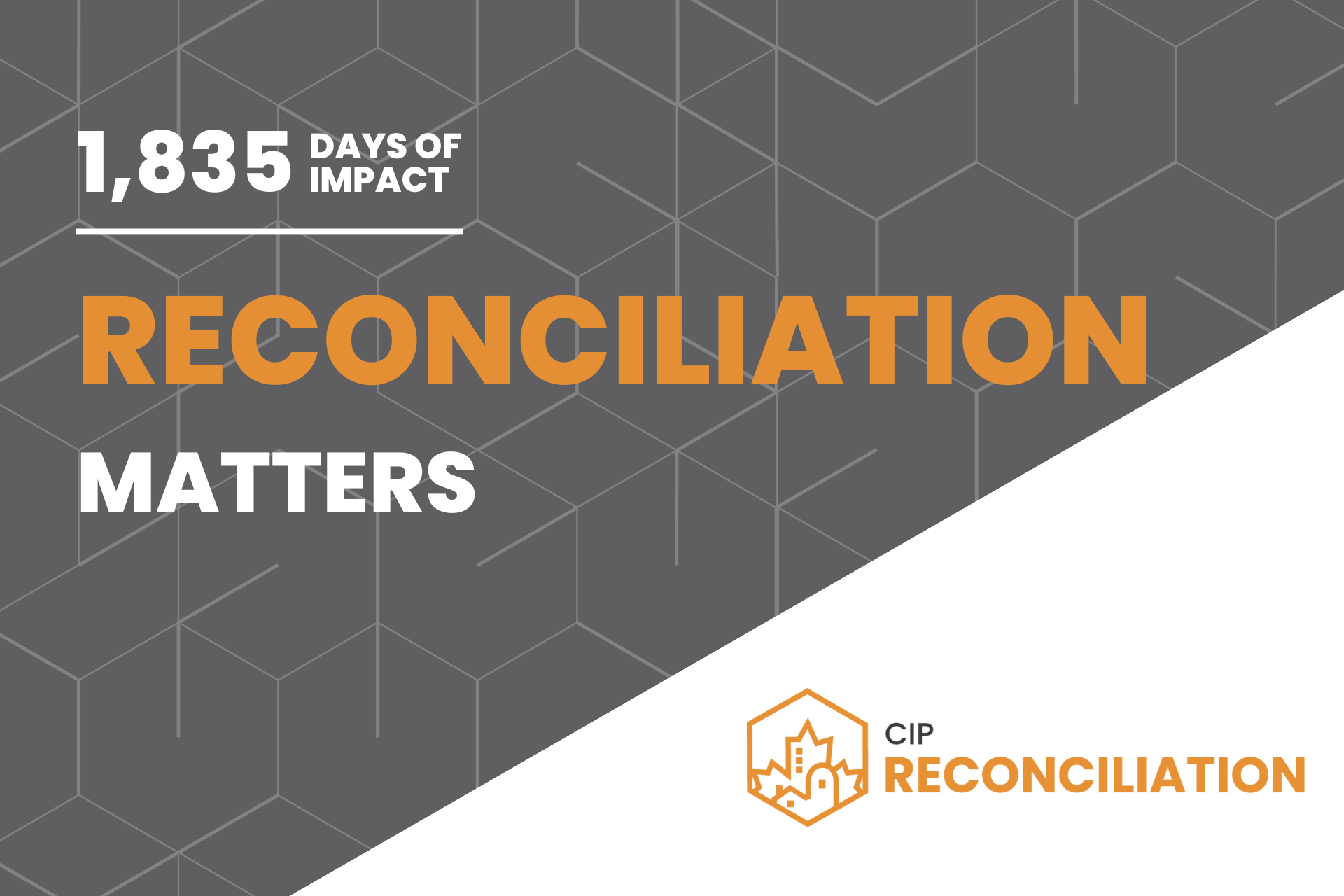Reconciliation Matters to Planners.
CIP envisions a future in which reconciliation is meaningfully embedded in planning practice in Canada and planners build relationships with Indigenous peoples based on mutual respect, trust, and dialogue. To support the journey toward reconciliation, CIP plans its actions in alignment with these commitments.

Prior to the adoption of the new Strategic Plan–1,835 Days of Impact–CIP endorsed the implementation of the United Nations Declaration on the Rights of Indigenous People (UNDRIP) in 2017 and published a Policy on Planning Practice and Reconciliation in 2019. Building on this strong foundation, CIP continues to support reconciliation—both within and beyond the planning profession—through a mix of advocacy, policy leadership, awareness and capacity building, and financial support. We also live by our values of Inclusive Mobilization and Respectful Stewardship.

CIP’s Contributions to Reconciliation
CIP’s actions contribute to the reconciliation journey and engage with Indigenous-related topics on two levels:
- Leadership and the Structure of the Planning Profession (including the Planning Profession Ecosystem)
- Members and Planners at Large
Leadership and the Structure of the Planning Profession
Against the backdrop of the principles of the Truth and Reconciliation Commission’s Final Report and United Nations Declaration on the Rights of Indigenous People (UNDRIP), CIP’s policy on Planning Practice and Reconciliation is a call to action for planners to engage in meaningful and sustained relationship building with Indigenous peoples.
The policy was developed through extensive engagement with Indigenous planning practitioners and community leaders, along with CIP members, over an eighteen-month period. Engagement was carried out through the use of individual interviews, focus groups, and surveys. The policy is the first and only set of professional planning guidelines in Canada related to reconciliation.
Putting policy into action, as a symbolic step towards reconciliation, the elected leadership of CIP and the Provincial and Territorial Institutes and Associations (PTIAs) participated in a Blanket Ceremony led by Chepximiya Siyam’/Chief Janice George, Squamish hereditary chief, and her husband Skwetsimeltxw Willard ‘Buddy’ Joseph, in advance of the 2022 CIP national conference. The conference was held on the shared territories of the Lil̓wat7úl and Sḵwx̱wú7mesh peoples (Whistler, B.C) and the ceremony–a reaffirmation of the profession’s support for reconciliation through learning, humility, and action–took place at the Squamish Lil’wat Cultural Centre.
In the last two years, CIP has been active in helping to update the profession’s competency standards with the PTIAs, working to ensure that a reconciliation lens is applied. This work is on-going.
CIP is also working closely with the PTIAs and PSB to amplify shared messages on reconciliation, including issuing a joint statement for National Indigenous History Month in June 2023.
Other commitments related to CIP’s leadership and staff team include the requirement for all Board and staff members to complete The Path Indigenous cultural competency course in 2023, cultural training for staff (including a presentation led by an Indigenous staff member from Mādahòkì Farm), and the observation of the National Day for Truth and Reconciliation.
CIP Members and Planners at Large
CIP is committed to providing our members with learning and capacity-building opportunities, resources, and policy support to help individual members of the profession walk their own journeys of reconciliation. For example, in recognition of NIHM, in June 2023, CIP proudly partnered with the National Capital Commission‘s (NCC) Urbanism Lab on “Lessons in Indigenous Planning.” CIP has also collaborated on an international webinar on Indigenous perspectives that will take place on September 26, 2023. Our commitment to reconciliation also extends to our publications, with regular Indigenous Planning articles featured in Plan Canada magazine and research in the Canadian Planning and Policy Journal. Please find a full listing of recent resources on the CIP blog.
CIP continues to promote Indigenous-focused sessions at the annual national conference. Close to 20% of thematic sessions have been dedicated to Indigenous planning at the conferences in recent years, which also include representation from Indigenous Elders and drummers. Many of these sessions have been recorded and are available on-demand to members in the CPL HUB. In 2023, CIP also introduced an Inclusion Fund for the conference, aimed at increasing the participation rates of the equity-deserving groups, including Indigenous delegates (membership in CIP is not required).
With the goal of promoting professional opportunities for Indigenous planners, CIP now also offers complimentary job postings on the CIP National Job Board to Indigenous employers, employers seeking an Indigenous applicant, and for Indigenous-focused positions.
Additionally, CIP and our members continue to support financial aid initiatives for Indigenous students. First, CIP is proud to co-administer the SOAR Professional Services Indigenous Student Bursary with CIP/ICU-Planning Student Trust Fund (CIP-PSTF). Second, the College of Fellows Indigenous Planning Student Award—providing two annual awards of $5,000, administered through Indspire—supports Indigenous students in their post-secondary studies at an accredited Canadian planning program.
The Journey Continues
In addition to the ongoing nature of the above commitments and work, CIP looks forward to launching the Indigenous cultural competency program The Path: Your Journey Through Indigenous Canada in English (October 4) and in French (December 1). The Path is an acclaimed and interactive 6-module course on the history and contemporary realities of First Nations, Inuit, and Métis in Canada, developed by NVision–a majority Indigenous-owned consulting company dedicated to empowering Indigenous communities.
Finally, CIP continues to seek the most culturally appropriate and meaningful ways of contributing to the Reconciliation journey and is now in the early stages of developing a Reconciliation Guiding Plan to utilize its resources effectively and further implement its policy.



